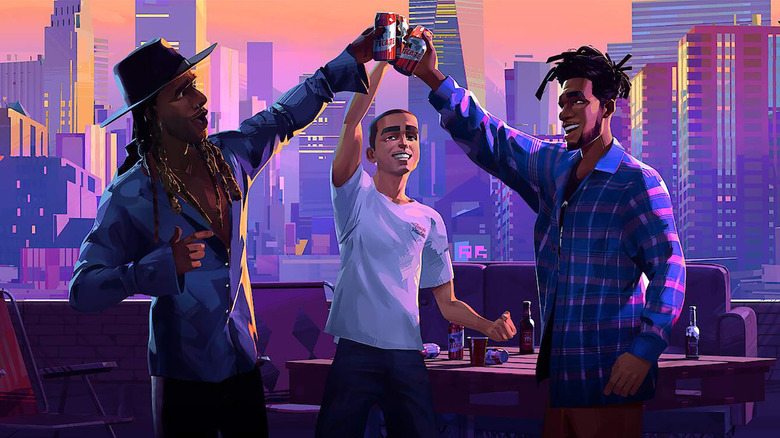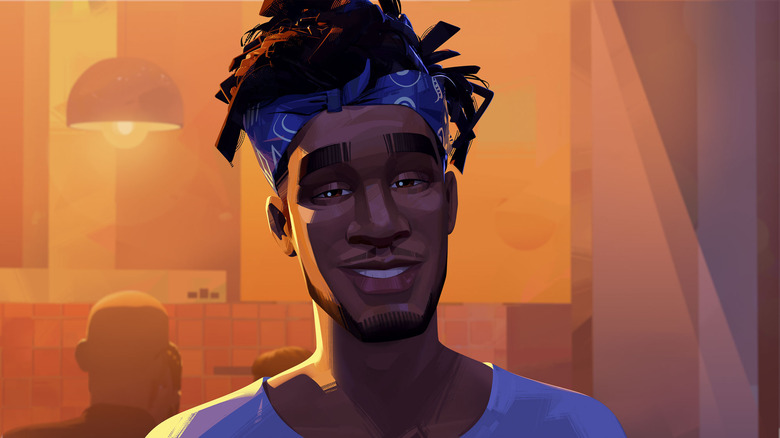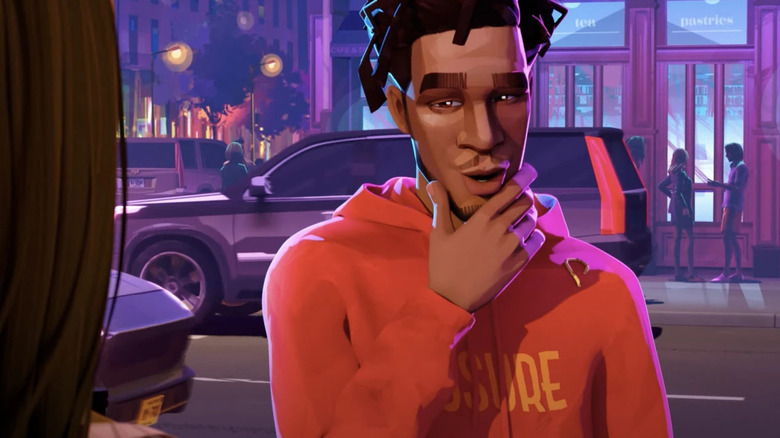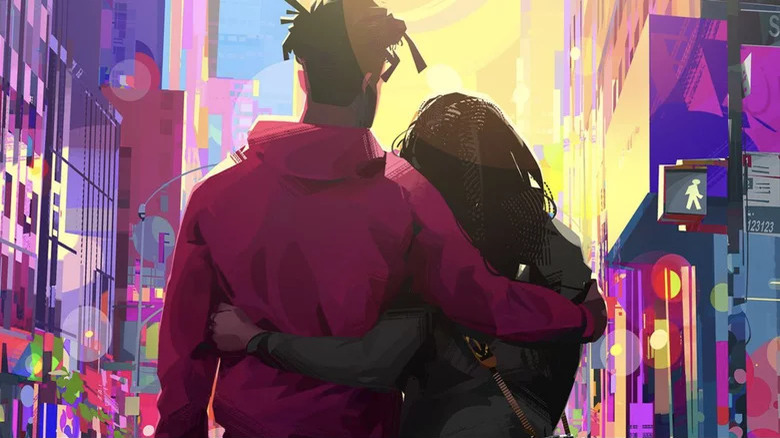Entergalactic Filmmakers Hope The Movie Can Be A Beacon For New Storytelling In Adult Animation [Exclusive Interview]
From the minds of Kid Cudi and executive producer Kenya Barris, the adult animated feature "Entergalactic" is finally available for streaming. Though the animated feature is both inspired by and connected to Kid Cudi's simultaneous album release of the same name, the feature itself boasts an independent story with a talented cast of actors voicing its characters.
"Entergalactic" is about NYC artist-on-the-rise Jabari (Scott Mescudi/Kid Cudi), whose everyday life is disrupted when he falls for his neighbor, the equally talented photographer Meadow (Jessica Williams). The pair have to navigate their unexpected connection despite rising career pressures and the reemerging feelings of Jabari's ex Carmen (Laura Harrier).
The animated journey is a fun ode to love in the city with a gorgeous animation style, and the scenes are well-paired with Kid Cudi's new tracks. I spoke with director/executive producer Fletcher Moules and co-writer/executive producer Ian Edelman and producer Maurice Williams about the process of bringing the project to life, working from Kid Cudi's music, their hopes for adult animation, and more.
This interview is lightly edited for clarity.
'I want to make something that lives on its own'
"Entergalactic" started as a series before becoming this animated adult feature tied to Kid Cudi's album. How did it came to be, and how did you become attached to it?
Maurice Williams: I guess we should [start in] chronological order. Scott had gotten in contact with one of our executive producers, Kenya Barris, and he and I met with them, and we were talking about what you just described. How do you event-ize music drops? There've been attempts, whether you think of "Purple Rain," Beyonce's "Lemonade" or "Black Is King." Casey Musgraves, I know, just did one.
There are artists who have tried it, but it usually it always feels short, because it always feels like the music is driving this thing, and the story runs behind it, or it looks really cool, but "I don't really care what's going on." To Kenya's credit, he was like, "Well, the difference is that there's never character investment," because TV is the best form of character investment, right? So that's how we got in the TV pond. We're like, "Let's make these characters, who we really, really enjoy."
Then, once Scott was like, "Well, the story doesn't need to be about me, I want to make something that lives on its own," that's when you really get to this special thing, where it becomes a concept album release, or concept kind-of-thing. When you think about "Sgt. Pepper" or something like that, you create these characters that you can get behind and then [go] from there. I was really, really fortunate that Ian came on, and we started the writing process with Cudi... a couple of months later, Fletch came on, and it just snowballed into that thing. The story of "what it is" [specifically] is a different story, but you just kind of adapt.
Fletcher Moules: Yeah, that's just the process of making something, right? We had the scripts and we were storyboarding. I was working away with the board artists, and we were all editing the, I guess they were episodes, and then we were just making it feel right. [It's] the process of "what is this thing?" We ended up editing it down, finding the right story, finding the cadence we needed to be engaged with this whole story and our characters, and ended up [with] six 15-minute chapters, and we're like, "This is 90 minutes... well, what if we just did that?"
'I hope Entergalactic can be a beacon in the rest of the industry'
In the U.S., there isn't a lot of non-genre adult animated work out there, but there's a lot of potential. Do you think this can contribute towards that being more prominent?
Williams: We hope so.
Moules: Obviously in Japan, especially, it's a huge part of culture. I think you're incredibly right, and you touched on a great point that, right from the start, we all talked about this — [...] Mike Moon, Elizabeth Porter at Netflix, and then with Kenya and Scott and all the team going — what we are aiming to do here exactly is not a genre. We're using animation, our medium, to make something that happens to be the right way to tell this love story, and to put the music into this love story, to visualize. I think that came from... when we knew it was going to be animated, it was listening to the music, looking at [...] our characters in New York City, this was the right way to express this story.
I think that's the great thing about animation, right? I hope there is more of this, and I hope "Entergalactic" can be a beacon in the rest of the industry, where we're able to see more of this work out there, [and] it doesn't need to be led by large family content or a superhero attached.
Williams: Exactly.
Moules: It can be just a simple story like ours.
Williams: And there are people in the space who have done some amazing work before us that was super inspiring... the "Arcane" team, the "Undone" team...
Moules: "I Lost My Body" is one of those. For me, when I started this, "I Lost My Body" was probably the inspiration for me, just because that is an adult, simple story fantastically told, that I was like, "Well, if we can do something in that realm, I'll obviously be proud."
'We had these incredible landmarks to write to'
It must have been a unique writing challenge to spin this independent story that's still tied to this album that comes first and inspires it. What was it like working that way?
Ian Edelman: It was a lot of fun, I'm going to be honest. Fletcher just said this, but you had the emotion, you had the tone, you had the feel... so you were just writing. You were still beginning at the beginning, finding these characters and building this world, but we had these incredible landmarks to write to so it was actually super fun. I've known Scott pre-"Entergalactic," and I met Maurice through Kenya. I have to say, it was really a very fortunate, rare experience where we all saw the same thing. Obviously, it didn't make it easy, but it wanted to be what it was, which was a love story.
Williams: It also really was fun, because instead of thinking about act breaks, necessarily, or thinking about traditional things that you have when you're writing a script, we got to just literally go like [...] at the time it was four songs, right? "Here are these four songs. They're completely different, they're all kind of about the same thing." Thematically, everything starts to kind of fall in line, and that was just a really cool thing to be able to do, to be able to "George the Jungle" from each thing thematically and figure out the ebbs and flows of a story that goes around it. I think it's cool that it also is the order that the songs appear on the album. That goes to show how simpatico the storytelling was. It is the best way to listen to the music as well.
"Entergalactic" is now available on Netflix, and Kid Cudi's album of the same name is out now too.



